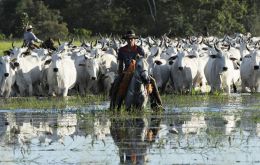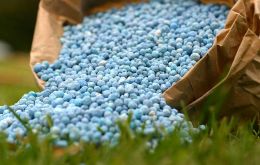MercoPress. South Atlantic News Agency
Agriculture
-
Thursday, July 29th 2021 - 07:39 UTC
Chilean agriculture short of manpower: some crops could remain without harvesting

Chile's National Agriculture Society, SNA, has warned that up to 30% of crops could remain without harvesting because of a lack of manpower. SNA head Cristian Allendes participated in a conference on the labor problem and incentives to attract people to work in the fields, which was presented under the title of “How is the 2020/21 season coming along?”.
-
Tuesday, July 27th 2021 - 07:20 UTC
Raisins, victim of the chaotic climate conditions

Chaotic climate conditions are having an impact on agriculture worldwide and in Chile the most recent victim of instability are raisins. Last January when grapes are expected to mature and develop a high content of sugar, torrential rains hit Chile's wines, and the excess of water harmed a high percentage of the harvest.
-
Monday, July 26th 2021 - 17:50 UTC
Brazil targets 300 million tons of grain for the 2024/25 harvest

Brazil should collect more than 300 million tons of grain by the 2024/25 harvest, three seasons earlier than initially planned, according to new projections by the Ministry of Agriculture. The previous forecast was to reach the target in the 2027/28 cycle.
-
Monday, July 26th 2021 - 08:46 UTC
“State of Hydric Emergency” decreed throughout Argentine provinces within the Parana river basin

Argentina Sunday declared a “water emergency” due to the historic downspout in the Paraná river.
-
Monday, July 26th 2021 - 07:41 UTC
Food Systems Pre Summit takes off this Monday in Rome: UN and Italy hosts

Several Mercosur top officials will be attending the 2021 United Nations Food Systems Pre Summit that takes off this Monday in Rome until 28 July. The UN and Italy are hosting the Pre-Summit gathering under the leadership of UN Secretary-General António Guterres and Prime Minister of Italy Mario Draghi.
-
Thursday, July 22nd 2021 - 09:28 UTC
Brazil imports record volumes of fertilizers, despite escalating prices

Brazil has imported record volumes of fertilizers during the first half of the year, some 14,1 million tons, an increase of 14% over the same period last year. The data was released by GlobalFert a specialized portal and points out June as the month with the highest volume.
-
Tuesday, July 20th 2021 - 09:25 UTC
Patagonia lawmakers call for an end to export duties on fisheries produce, fruit, lamb and wool

Argentina lawmaker from the province of Chubut, Gustavo Menna has called on the central government to eliminate export duties on fishery products, fruits, ovine meat and wool. The initiative was also drafted by lawmakers Lorena Matzen and Roxana Reyes from the provinces of Rio Negro and Santa Cruz.
-
Friday, July 16th 2021 - 08:18 UTC
WTO edges closer to an agreement on fisheries limiting government subsidies

The World Trade Organization edged closer on Thursday to an agreement that would set new rules for the global fisheries industry and limit government subsidies contributing to unsustainable fishing and the depletion of global fish stocks.
-
Monday, July 12th 2021 - 05:09 UTC
FAO Food Price Index, down 2,55 in June but still 33.9% higher than a year ago

Global food commodity prices fell in June for the first time in 12 months, according to a benchmark United Nations report. The FAO Food Price Index averaged 124.6 points in June 2021, down 2.5% from May, but still 33.9% higher than its level in the same period last year. The decline in June marked the first drop in the Index following twelve consecutive monthly increases
-
Saturday, July 10th 2021 - 08:11 UTC
Rural producers stage protest against Argentine government policies

A massive demonstration by Argentine rural producers convened Friday in the town of San Nicolás de Los Arroyos in the province of Buenos Aires to celebrate Independence Day and express their disapproval of the policies undertaken by the administration of President Alberto Fernández.